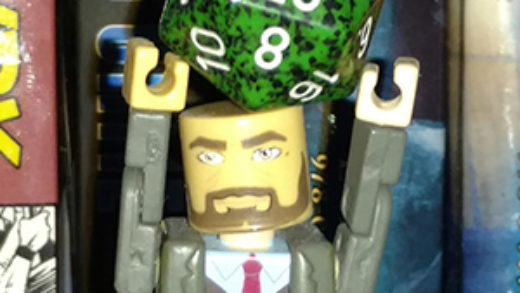Last week I discussed running a ship-based game and broached the topic of ignoring a plot hook. In the comments, “Auntie Mumpsimus” suggested this was breaching the social contract between GM and players. While this is more likely to occur in a ship-based game, it could potentially happen anywhere. What is the contract and what happens when it’s broken?
The Social Contract
There’s a typically unwritten, but understood social contract in a group. The clauses usually include things like “player characters shall not kill other players,” “what happens in game stays in game,” and “players shall accept the plot hooks provided by the GM.” The first clause I mentioned is game-dependent (in Paranoia, it’s expected PCs kill each other—and themselves), the middle is good (if sometimes difficult) advice, but it’s the third clause I mentioned that I want to discuss today. It’s typically understood that the GM does the majority of the leg-work in preparation for most games; be it devising a campaign or adventure from scratch or purchasing and reading a supplement ahead of time, getting an understanding of the adventure they’re about to run. The players, for the most part, simply play. GMs enjoy the “work” that they do and it’s likely one of the reasons they choose the task of sitting behind the screen. When players have their characters ignore the plot hook or actively act against it (or the campaign) then that social contract has been breached.
Transgressions
In a long running campaign, turning down the occasional plot hook can happen, especially in the spirit of role-play or if the PCs feel a contract reward isn’t worth the risk. In a past (ship-based) game, I tried to prompt the players to run a casino heist, but the idea of becoming actual criminals rather than smugglers just didn’t quite sit well. So, instead, it was a night of RP in a casino, introducing some NPC that could have shown up again. In effect, however, my work on a heist adventure that included the skills of every player character was dashed. And it was, also, a much shorter night of game-time. I didn’t have much energy for anything more dramatic to occur.
I used to read a lot of the comic Knights of the Dinner Table (I left off at Bundle of Trouble Thirty-Five, if anyone wants to help me add to my collection), in which the GM character, B.A., would often work overnight or spend money he couldn’t afford on an adventure only for the players to not only ignore the plot hooks, but go so far as to raze villages and kill the important NPCs under the guise that they were just “playing their characters.” This was presented as an extreme case for comedic effect; in various Internet forums, the comic characters were hailed as bad players. But there was an undercurrent of comments where some GMs felt they were treated this way (non-comedically) by their players.
Even long-term, experienced players can have a lapse in judgement—especially when real life is also affecting their emotions. In the early 2000’s I played a game using the Knights of the Dinner Table-inspired take on AD&D 2nd Edition, HackMaster. In the spirit of the comics, but not the game, I had built a character with a “campaign-wrecker,” personality and my own work stress on top of character play led to an evening-breaking blow-up. You can read the GM’s take on the escapade on RPG.Net. In this case, I was the transgressor, regardless of anything else.
When these things happen—and they will from time to time—the best thing to do end the session early and let any potential frustrations cool. The group can then reconvene at a later date to discuss if the incident was a fluke or if there’s a difference between what players want and what the GM is providing. This may lead to a change in game, players, or GM, but knowing what everyone wants and expects is key to maintaining an enjoyable game.
Formalizing the Covenant
Wether one is running a game or playing it, RPGs are like any hobby. They require time and effort. A smoothly running game is fun and doesn’t feel like there’s effort in adventure-writing, character creation, scheduling, hosting, and getting the right mix of socialization and game-play. In these instances that social contact goes unspoken… right until the point it’s broken. So, maybe the best option is to formalize the idea of how a particular campaign or game is to be structured before it begins. Players should enter a session with the mind-set of if there is going to be backstabbing amongst player characters, how much they should adhere to plot hooks, or how much they want to “drive” the game. The GM should know what the players expect of their game. This may sometimes mean a particular campaign isn’t suited for all players. At which point, new decisions of play style will need to be made or the group will need to shift in some other way.
Unlike the 80’s and 90’s when I was still cutting my teeth on table-top role-playing, it’s easier to find a game thanks to online table-top options. While some social interaction is lost, if a player wants to play a particular style of game, it’s easier to locate and, for the most part, gone are the limitations of locality. I think the ideal is still a group of friends, in the same room, gathered around a table of some sort, but that could often lead to real life friction, when play styles or genre preferences conflicted. At least now, though, if that social contract is discussed beforehand, it makes it easier for all involved to understand the state of the table and bow out if it’s not what they’re looking for.
Nothing is binding. Real life will interfere, plot hooks may not be understood, there are just “off” nights, and sometimes there will need to be a re-assessment of what is expected in a game. However, what should no longer occur is for that “unspoken social contract” to remain unspoken.


Recent Comments